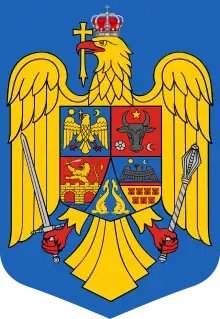Peasant Workers' Bloc
The Peasant Workers' Bloc (Romanian: Blocul Muncitoresc-Ţărănesc, BMŢ) was a political party in Romania that acted as a front group for the banned Communist Party of Romania.
 |
|---|
| This article is part of a series on the politics and government of Romania |
History
In the 1926 elections the BMŢ received 1.5% of the vote, failing to win a seat. The 1927 elections saw the party's vote share fall to 1.3%, again failing to win a seat. Although the 1928 elections saw their vote increase to 1.4%, they remained seatless.[1]
The 1931 elections were the party's breakthrough, winning five seats in the Chamber of Deputies with 2.5% of the vote.[1] The parliament refused to validate the elections of the five deputies and none of them served. However, the 1932 elections saw its vote share fall to 0.3%, with the party failing to win a seat. It was banned in the aftermath of the Grivița Strike of 1933, and did not contest any further elections. Its role as a communist front organization was partially taken over by the Labour League, created a few weeks before the 1933 elections.
Electoral history
References
- Dieter Nohlen & Philip Stöver (2010) Elections in Europe: A data handbook, pp1600–1611 ISBN 978-3-8329-5609-7